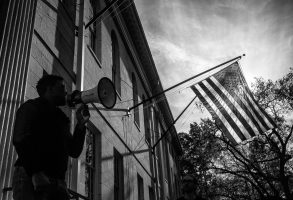
Published August 2, 2019
Americans are a morally ambitious, aspirational people. They are also a pragmatic people. These two qualities often find themselves at odds, and American citizenship often takes a seemingly self-contradictory form because it can manifest itself as criticism of America’s shortcomings in the light of her moral aspirations, or deep appreciation and affection for what she has achieved and accomplished in the light of the difficulties she has faced.
These two manifestations of American patriotism are today locked in battle over how to view American history, which some, in the light of her founding aspirations, deem to be irredeemably unjust, and others, in the light of the pragmatic, see as an undeserved gift today’s citizens are blessed to inherit. Recent battles over Columbus Day and Civil War-era memorials to Confederate soldiers may be taken as representative of this bifurcation among the citizenry.
Unfortunately, both of these visions of American history tend to obscure the mystery and messiness contained in history, American or otherwise. More often than not, history is a kind of stage on which breathtaking, beautiful, and sometimes dreadful things occur, and it is the historian’s task to tell the story of these things, and to inquire into why they happened the way they did, where they did, and when they did.

This is not to say that the historian is above history or that he sees history from a God’s-eye perspective. As Wilfred M. McClay writes in his excellent new history of America, Land of Hope: An Invitation to the Great American Story, “history always begins in the middle of things.” Not only does any historical inquiry assume a context that precedes the period one is discussing, but the historian himself also writes and inquires from within the middle of things—he exists, writes, and inquires within a previously existing context or “web of meaning.” This is not to say that the task of the historian is meaningless. On the contrary, the historian is, like all other human beings, informed by his particular circumstances, and it is in fact these particular circumstances that give human life meaning.
Particulars are infused with meaning. As embodied beings, humans access universal meaning through particular objects—I learn to love through my mother’s care and tenderness, I learn truth from Mrs. Johansson’s raspy voice teaching third-grade lessons in spelling, I learn beauty by gazing at the dappled light of the trees falling on the old white crown molding in my living room. It takes a lifetime to inquire into and find the meaning in these initial experiences, but the fact of meaning’s presence in them is no less so at the beginning.
As a result of their embodied, particular orientation to the world and the universal meanings contained in the particulars, human beings are “at our core, remembering and story-making creatures, and stories are one of the chief ways we find meaning in the flow of events.” Indeed, the search for meaning in the particular events that surround them is not a luxury but a necessity for human beings.
McClay’s “invitation” to the “American story” is animated by the confidence that his fellow Americans feel the need for meaning, they enjoy a good story, and they know a good story is both entertaining and just. It is also animated by humility, a sense implied in the title that the American story is inexhaustible and that all he can do in this (almost 450-page) book is extend a hand to his reader with an offer, not an argument. And in this McClay succeeds: the beauty and mystery of the story he tells will attract readers much more than any massively critical or triumphalist argument ever could. Throughout, he includes paragraphs-long series of questions after he has told sections of the American story—not the classic textbook questions your AP History used to assign, but questions worth pondering, the kind of meaningful and seemingly unanswerable questions Socrates used to pose to his young interlocutors who thought they had a handle on the meaning of Athens but who didn’t yet know they had not yet begun to think.
Even those who believe America’s history to be a case-study in oppression and injustice will be hard-pressed not to consider McClay’s account of American history beautiful. America has always been a land of hope, according to McClay, and there is perhaps no more fundamental desire and hope embodied by America than the desire to belong. American history can be seen as a result of the unsettlement of Europe and the settlement of the “new world” in the West, and therefore as the fulfillment and continual unfolding of a deep-seated desire of human beings for freedom and belonging simultaneously.
To return to where we began: A land of hope is one that is ever moving toward a better future but also one that must see its limitations and appreciate how to work within the context of limitation. McClay’s account of America ultimately points readers toward this seeming contradiction which, in his woven-together story of the country, reveals itself in the end as the glory of living out tensions inherent in the human condition. Neither the critical nor the triumphalist views of American history are, in the last analysis, the most comprehensive accounts of America. Instead, McClay invites his reader to consider that the glory of America is in managing and living out the tension between her high ideals and her historical circumstances. That glory, though not without its difficulties and frustrations, is worth pondering with a sense of wonder, a sense McClay helps engender in his reader.
Ian Lindquist is a Fellow at the Ethics and Public Policy Center.








